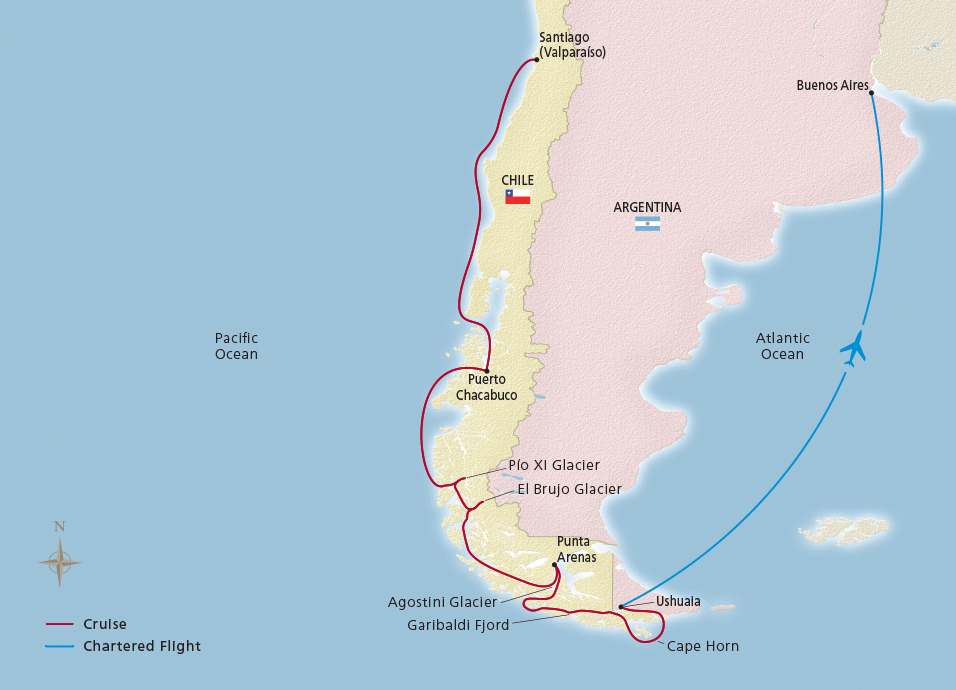Call us or email us if you have any questions.

Untouched wilds and majestic fjords
Experience the stunning beauty of Patagonia’s rugged terrain. Marvel at blue-tinged glaciers up close and gain insight into the unblemished wilderness from your team of onboard experts. Explore the pristine Chilean fjords by Zodiac, Special Operations Boat or kayak and immerse yourself in Patagonian culture during calls on Puerto Chacabuco and Punta Arenas.

Santiago (Valparaíso), Chile / Ushuaia, Argentina
2024 Sailings on November
* Please check with us for dates & pricing
Cruise fare from $12,295.0 per person
* Please check with us for dates & pricing

Embark your ship and settle into your stateroom. Chile’s modern capital of Santiago is one of the largest cities in the Americas. Its impressive neoclassical, neo-Gothic, art deco and other architecture spans several centuries. Santiago’s gateway, Valparaíso, is often compared to San Francisco for its many cerros, or hills. The city prospered as a major port until the opening of the Panama Canal rendered it unnecessary. Quaint Victorian-era architecture recalling its 19th-century affluence and steeply sloped barrios are linked by ascensores, or funiculars, and winding byways. From Los Cerros, the views are spectacular.
Sail Mar Pacífico, meaning “peaceful sea,” dubbed by Ferdinand Magellan when he crossed these waters almost 500 years ago. As you sail today, attend an informative lecture or watch a film on our 8k laser-projected panoramic screen in The Aula, one of the world’s most advanced venues for learning at sea. This indoor-outdoor experience allows nature to take center stage with its retractable floor-to-ceiling windows that unveil 270° views.
A pristine paradise of soaring peaks, countless lush islands teeming with wildlife and a tapestry of glaciers and rivers spilling into shimmering waters, the fjords of Chile are heralded as one of the most rugged and untamed places on earth. The crystal waters are a breathtaking sight as they journey through vast ice fields, towering mountainsides and serene fishing villages that hug tranquil shores against backdrops of dramatic forested hills.
Puerto Chacabuco is a tiny Patagonian enclave and gateway into the spellbinding beauty of the rugged wilderness. The port was named for the 1817 Battle of Chacabuco, a pivotal moment during the Chilean War of Independence, in which national hero José de San Martín of the Army of the Andes defeated the royalist forces. Jagged rocky peaks with deep-cut gorges, icy-blue glaciers spilling into the sea and pine-green forests clinging to steep slopes dominate this untouched region, one of the most inspiring and breathtaking corners of the globe.
The fjords and channels of Chile were first inhabited by indigenous people who used the wood of the endemic Pilgerodendron uviferum, a conifer tree, to build their canoes and homes. Spanish conquistadors began exploring the region during the mid-16th century, navigating the fjord’s internal passageways to avoid the heavy seas and bad weather of the Pacific Ocean. The harsh climate and declining local populations limited colonial expansion, leaving the fjords sparsely populated—a situation that continues to this day.
The gigantic Patagonian Ice Sheet covered southern Chile in a thick blanket of ice and snow during the last Ice Age. Around 12,000 years ago, rising temperatures caused it to begin melting, carving out the Patagonian landscape as it receded. Today, two vast sections, northern and southern, remain of this ancient ice sheet. Together, they cover more than 5,400 square miles and form the third largest frozen landmass on Earth. At their edges are towering glaciers of blue-tinged ice, whose ever-changing faces create the large icebergs that float in the fjords and channels.
The picturesque Chilean Fjords stretch nearly 1,000 miles from Cape Horn at the South American continent’s southern tip to the Reloncaví Estuary just below the city of Puerto Montt. Carved out by receding glaciers starting more than 2.5 million years ago, the fjords are composed of several hundred channels and passages that wind their way past walls of blue ice, dense forests and steep mountain ranges. Its rugged coastline is home to colonies of Magellanic penguins and lazing elephant seals, while its waters welcome dolphins, migrating humpback whales and orcas on the hunt.
Punta Arenas was founded as a penal colony by Chile in 1848. Nestled amid spectacular mountain vistas on the eastern shores of the Brunswick Peninsula, it played host to mariners crossing the continent by ship. Europeans followed, searching for newly discovered gold and establishing vast swaths of sheep farms locally and throughout the surrounding region. Over time, Punta Arenas became one of Chile’s most important ports as, before the opening of the Panama Canal, it laid on the northernmost transcontinental shipping route.
Spanning the border of Chile and Argentina, the Southern Patagonian Ice Field stretches along the spine of the Andes Mountains for more than 200 miles. Chile itself is home to almost 80% of South America’s glaciers, covering an estimated 7,700 square miles. These glaciers act as enormous freshwater reserves for the mountain habitats across Patagonia, helping to sustain the region’s diverse plants and wildlife.
The pristine waters of the Garibaldi Fjord weave their way through the Alberto de Agostini National Park in Chile, where the Andes mountain range meets the ocean. The region is a UNESCO Biosphere Reserve and its majestic natural wonders are home to an array of wildlife. Its valley walls are covered with ice and floating icebergs drift along with the bobbing heads of seals and sea lions. The Garibaldi Glacier feeds the waters of the fjord, and this retreating 12 square mile spectacle dwarfs any vessel that passes by.
Rising above the point where the Atlantic and Pacific Oceans converge, Cape Horn, named for the Dutch city of Hoorn in The Netherlands, is part of the Hermite Islands archipelago. This remote, stark and treeless place is often considered the continent’s southernmost point. Soaring from Hornos Island is an enormous prehistoric-looking massif of Jurassic volcanic rock. Atop, stands its historic lighthouse near the water’s edge. A beacon of assurance and safety for countless sailors since 1991, it is the world’s southernmost traditional-style lighthouse.
Ushuaia is the southernmost city in the world. Its splendid setting, tucked between the Beagle Channel and the southernmost slopes of the Andes, lends it an outpost atmosphere, as do the Antarctic explorers readying for the expeditions that depart from here. Ushuaia is the capital of and gateway to the celebrated Tierra del Fuego, the “Land of Fire,” named by Spaniards upon seeing the constant flames burned by the indigenous Yámana to keep warm. This largely unspoiled region comprises the large island of Tierra del Fuego and countless Chilean and Argentinean islands. Disembark your ship and transfer to the airport for your charter flight. Bid farewell to your fellow travelers and journey home from Buenos Aires.
* One shore excursion included per port; all others available at an extra charge.